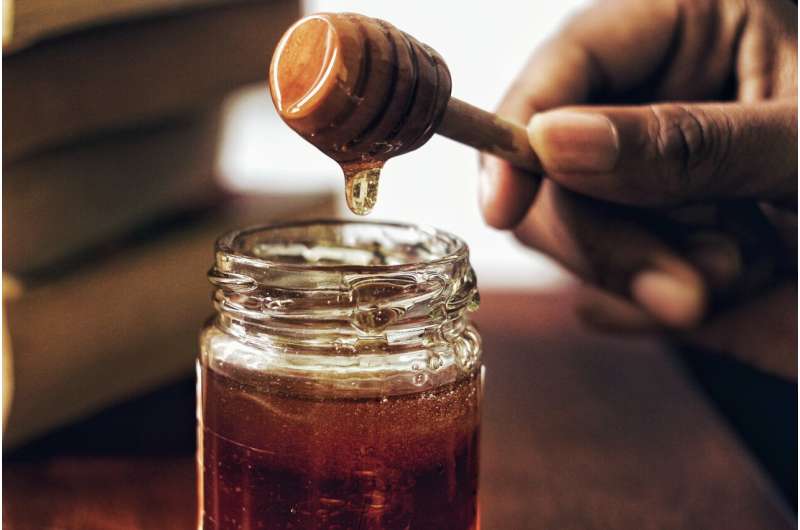This article has been reviewed according to Science X's editorial process and policies. Editors have highlighted the following attributes while ensuring the content's credibility:
fact-checked
peer-reviewed publication
trusted source
proofread
Preclinical study shows potential of Manuka honey as a nutraceutical for breast cancer

A study led by investigators at the UCLA Health Jonsson Comprehensive Cancer Center found that Manuka honey could potentially be an alternative, natural option for breast cancer prevention and treatment—particularly for estrogen receptor (ER)-positive breast cancer, the most common subtype of breast cancer that accounts for about 70–80% of all breast cancer cases.
The study was published in the journal Nutrients.
In preclinical experiments, researchers found:
- Manuka honey significantly reduced tumor growth in mice with ER-positive breast cancer cells by 84% without affecting normal breast cells or causing major side effects.
- Higher concentrations of Manuka honey led to a greater reduction in cancer cell growth.
- Manuka honey reduced levels of signaling pathways that are upregulated in cancer such as AMPK/AKT/mTOR and STAT3, which are involved in tumor cell growth and survival.
- Manuka honey reduced the proliferation of cancer cells but did not affect the growth of normal human mammary epithelial cells, indicating it might target cancer cells specifically.
- Manuka honey induced apoptosis or cell death of breast cancer cells.
- The Manuka honey enhances the effectiveness of existing treatments such as tamoxifen, a commonly used antiestrogen drug in ER-positive breast cancer therapy, when used to together.
There is an urgent need for alternative treatments to help prevent the development of endocrine resistance and improve long-term breast cancer survival. Endocrine resistance is a major factor contributing to breast cancer being the leading cause of cancer-related deaths among women worldwide.
New research has shown that Manuka honey, long known for its antimicrobial and antioxidant properties, is also rich in compounds like flavonoids, phytochemicals, complex carbohydrates, vitamins, amino acids, and minerals. These compounds have demonstrated anticancer potential at a molecular level by inhibiting pathways activated in cancer that induce tumor cell proliferation, growth, and metastasis.
Researchers theorize that one of the mechanisms of action of Manuka honey is to block estrogen receptors, making it potentially effective as a nutraceutical against hormone-sensitive breast cancer.
To understand the potential of Manuka honey as a natural treatment for breast cancer, the research team conducted a series of experiments in mice and in ER-positive MCF-7 and triple-negative MDA-MB-231 breast cancer cell lines, which represent two of the most common types of breast cancer. In these models, oral administration of Manuka honey resulted in a significant reduction in tumor growth compared to control groups. This significant inhibition of tumor progression underscores the honey's potential effectiveness as a treatment for cancer prevention or treatment.
The findings suggest that Manuka honey could potentially be developed into a natural supplement or even a standalone treatment for ER-positive breast cancer, particularly for patients who experience resistance to traditional therapies.
"The findings provide hope for development of a natural, less toxic alternative to traditional chemotherapy," said Dr. Diana Marquez-Garban, associate professor of medicine at the David Geffen School of Medicine at UCLA, and the study's first author. "Although more research is necessary to fully understand the benefits of natural compounds in cancer therapy, this study establishes a strong foundation for further exploration in this area."
The study's senior author is Dr. Richard Pietras, professor of medicine at the David Geffen School of Medicine at UCLA. Both Pietras and Marquez-Garban are members of the UCLA Health Jonsson Comprehensive Cancer Center. Other authors, all from UCLA, are Cristian Yanes, Gabriela Llarena, and Drs. David Elashoff, Nalo Hamilton, Mary Hardy, Madhuri Wadehra and Susan McCloskey.
More information: Diana C. Márquez-Garbán et al, Manuka Honey Inhibits Human Breast Cancer Progression in Preclinical Models, Nutrients (2024). DOI: 10.3390/nu16142369




















